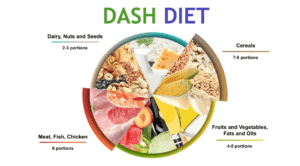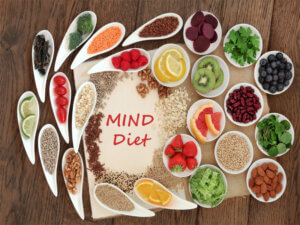The 9 Best Diet Plans for Your Overall Health
Losing weight is not the only advantage of following a diet. The most effective plans for shedding pounds also positively affect your general well-being. The main obstacle is discovering the right program that suits your needs.
Healthy eating habits are not only important for weight loss, but also for improving your overall well-being and leading a more active lifestyle. However, with so many different best diet plans available, deciding which is right for you can be overwhelming.
Each plan has its own unique approach, with some focusing on reducing appetite while others emphasize limiting calorie and fat intake. Additionally, certain diets prioritize lifestyle changes and specific eating patterns over restricting certain foods. In addition to weight loss, many of these diets offer various health benefits.
Keep reading to discover the top 9 best diet plans for your overall health.

DASH diet
The DASH, known as Dietary Approaches to Stop Hypertension, serves as a beneficial eating plan designed to prevent high blood pressure. Focused on a well-balanced intake of fruits, whole grains, vegetables, lean meats, and limited servings, it has demonstrated positive health outcomes beyond blood pressure control.
Food Composition of the DASH Diet
The DASH diet emphasizes regular consumption of:
- Five servings of vegetables
- Five servings of fruit
- Seven servings of healthy carbohydrates like whole grains
- Two servings of low-fat dairy products
- Two servings or fewer of lean meats
- Nuts and seeds two to three times per week
Health Benefits of the DASH Diet
- Blood Pressure and Heart Health: Numerous studies have shown the DASH diet’s effectiveness in reducing blood pressure levels and mitigating heart disease risk factors. Additionally, it may lower the risk of breast and colorectal cancers.
- Weight Loss: Despite not being initially designed for weight loss, the DASH diet has shown promising results in shedding excess weight. Studies reveal that individuals on the DASH diet tend to lose more weight over a specific period compared to those on a control diet.
- Less chances of depression: The DASH diet might reduce the risk of depression, according to an 8-year study that found moderate adherence to the diet to be associated with lower depression risk.
- Overall well-being: Studies indicate that, over 12 weeks, the DASH diet can reduce total body weight, body fat percentage, and absolute fat mass while preserving muscle strength in individuals with obesity.
Considerations and Downsides
- Salt Intake and Blood Pressure: While the DASH diet is effective in weight loss and blood pressure reduction, there’s mixed evidence on salt intake. A low-sodium diet is suitable for individuals with hypertension, but it may not be universally appropriate.
- Insulin Resistance: Some research suggests that extremely low sodium intake may lead to increased insulin resistance. The DASH diet, being a low-sodium diet, may not be the optimal choice for everyone, and further research is needed in this area.
The DASH diet offers a structured and evidence-based approach to heart health, providing not only blood pressure control but also contributing to weight loss and additional health benefits. As with any dietary plan, individual considerations and consultation with healthcare professionals are advisable for personalized and effective implementation.

Mediterranean diet
The Mediterranean diet is one of another best diet plans, renowned for its rich flavors and health benefits, is more than just a way of eating—it’s a lifestyle. Rooted in the culinary traditions of countries bordering the Mediterranean Sea, this diet emphasizes fresh, whole foods and has garnered global attention for its potential to promote overall well-being.
Food Composition of the Mediterranean Diet
Centered around fruits, vegetables, whole grains, olive oil, and lean proteins, the Mediterranean diet boasts a diverse and nutrient-rich menu. Incorporating staples like fish, nuts, and legumes, it offers a deliciously balanced approach to nourishment.
Health Benefits of the Mediterranean Diet
- Research has shown that this is one of the best diet plans that can help lower the risk of chronic diseases and increase life expectancy as it focuses on minimally processed foods and plants.
- Several studies have also suggested that the Mediterranean diet may have a preventive effect against certain types of cancers. Despite being initially designed to reduce heart disease risk, the diet’s plant-based and high unsaturated fat dietary pattern is effective in aiding weight loss.
- A systematic review of five studies found that the Mediterranean diet resulted in more significant weight loss after one year than a low-fat diet and produced similar weight loss results compared to a low-carb diet.
- Furthermore, a study of over 500 adults over 12 months found that those who adhered more closely to the Mediterranean diet were twice as likely to maintain their weight loss.
- This diet also promotes the consumption of antioxidant-rich foods that may help combat inflammation and oxidative stress by neutralizing free radicals.
- The Mediterranean diet is beneficial for avoiding or reducing mental stress and disorder. Eating a reduced amount of meat is connected to a more environmentally friendly diet.
Considerations and Downsides
While praised for its numerous benefits, the Mediterranean diet may pose challenges for those accustomed to different eating habits. Considerations include accessibility to certain foods and potential cultural adjustments. Moreover, individuals with specific dietary restrictions should tailor the diet to meet their nutritional needs.
Overall, the Mediterranean diet promotes the consumption of fruits, vegetables, fish, and healthy oils while limiting refined and highly processed foods. While it isn’t specifically designed for weight loss, research indicates that it can lead to both weight loss and improved overall health.
Low carb diets
Opting for a low carb diet is a deliberate decision towards leading a healthier lifestyle. By focusing on nutrient-dense foods and minimizing carbohydrate intake, individuals aim to reap the numerous health benefits associated with this dietary approach.
Food Composition of Low-Carb Diet
- The foundation of a low-carb diet is based on whole foods like lean proteins, vegetables, nuts, and seeds.
- High-carb sources like grains and sugars are limited.
- Adopting this composition encourages stable blood sugar levels and facilitates weight management.
Health Benefits of the Low-Carb Diet
- The low-carb diet is renowned for promoting weight loss, improving metabolic health, and enhancing cardiovascular markers. It has shown efficacy in managing conditions like type 2 diabetes, reducing inflammation, and fostering mental clarity, making it a versatile choice for overall well-being.
- The low-carb diet promotes weight loss by reducing calorie intake and increasing fat burning.
- Adopting a low-carb diet can positively impact metabolic health, improving insulin sensitivity and better blood sugar control.
- This diet has been linked to better heart health by improving cardiovascular markers such as blood pressure and triglyceride levels.
- The low-carb diet has been associated with enhanced cognitive function, providing individuals with mental clarity and sustained focus throughout the day.
Considerations and Downsides
- While effective, the low-carb diet may pose challenges, including potential nutrient deficiencies and initial adjustment periods.
- Individuals should carefully consider their nutritional needs, and those with certain health conditions should consult with healthcare professionals to ensure a balanced approach.
In conclusion, the low-carb diet offers a promising avenue for individuals seeking to prioritize health through mindful food choices. By embracing nutrient-rich options and being aware of potential considerations, individuals can embark on a fulfilling journey toward improved well-being.
MIND diet
The MIND diet is a hybrid version of the Mediterranean and DASH diets. It stands out as a dietary approach specifically designed to promote brain health. By emphasizing nutrient-rich foods, it aims to decrease the risk of cognitive decline and enhance overall mental well-being.
Food Composition of the MIND Diet
Comprising a medley of brain-boosting foods, the MIND diet emphasizes leafy greens, berries, whole grains, fish, nuts, and olive oil while minimizing red meat, butter, and sugary treats. This unique composition harnesses the power of antioxidants and essential nutrients to nourish the brain.
Health Benefits of the MIND Diet
- Research suggests that adhering to the MIND diet may offer various health benefits, including a reduced risk of Alzheimer’s disease.
- The incorporation of foods rich in omega-3 fatty acids, vitamins, and antioxidants contributes to improved cognitive function and overall brain health.
- The MIND diet’s emphasis on brain-boosting foods, such as berries and leafy greens, has been linked to improved cognitive function and a potential reduction in the risk of neurodegenerative diseases like Alzheimer’s.
- With a foundation in Mediterranean and DASH diet principles, the MIND diet includes heart-healthy components like fish and olive oil, contributing to cardiovascular well-being and overall heart health.
- The diet’s rich array of fruits, vegetables, and nuts provides a robust dose of antioxidants makes this one of the best diet plans. It also helps combating oxidative stress and inflammation associated with various chronic diseases.
- By encouraging a well-rounded selection of nutrient-dense foods, the MIND diet supports overall nutritional balance, promoting vitality and potentially reducing the risk of nutrient-related deficiencies.
Consideration and Downsides
- While the MIND diet is hailed for its brain-boosting potential, individual responses may vary.
- Adherence to the strict guidelines might pose challenges, and potential downsides include the need for long-term commitment and the adjustment to a new dietary pattern.
- Additionally, more research is needed to fully understand the diet’s impact.
The MIND diet emerges as a promising ally, weaving together the nutritional strengths of the Mediterranean and DASH diets. While it presents considerations and potential downsides, its focus on brain-healthy foods offers a flavorful and purposeful approach to nourishing the mind.

Intermittent fasting
Intermittent Fasting (IF) is a dietary approach cycling between periods of eating and fasting. It has gained popularity for its various health benefits and adaptability to various lifestyles. Let us consider why it comes under best diet plans.
Food Composition of Intermittent Fasting
- IF focuses on when to eat rather than what to eat.
- It doesn’t prescribe specific foods but emphasizes nutrient-dense, balanced meals during eating windows.
- Common methods include the 16/8, 5:2, and Eat-Stop-Eat.
Health Benefits of Intermittent Fasting
- IF may aid weight management, improve metabolic health, and offer potential benefits for brain function. It could also support cellular repair processes and longevity.
- Intermittent Fasting has shown promise in supporting weight loss and weight maintenance by promoting a calorie deficit during fasting periods, encouraging the body to utilize stored fat for energy.
- Fasting may trigger autophagy, which removes damaged cells and promotes new ones.
- Some studies suggest that IF could have positive effects on brain health, potentially enhancing cognitive function and reducing oxidative stress.
Considerations and Downsides
While IF can be effective, it might not suit everyone. Considerations include potential nutrient deficiencies, impact on exercise performance, and its suitability for individuals with certain health conditions. It’s essential to consult with healthcare professionals before adopting IF.
Intermittent Fasting presents a flexible approach to eating patterns with potential health advantages. However, individual considerations and consultation with healthcare providers are vital to ensure its suitability and mitigate possible downsides.
WW (formerly Weight Watchers)
The WW (formerly Weight Watchers) diet isn’t just a weight loss plan; it’s a holistic approach to wellness. Embracing a flexible points system it empowers individuals to make mindful food choices, fostering a sustainable and personalized journey toward health.
Food Composition of WW Diet
The Weight Watchers diet focuses on a balanced approach, assigning SmartPoints to foods based on their nutritional value. This encourages a diverse and nutrient-rich diet, promoting long-term adherence and flexibility in food choices.
Health Benefits of the WW Diet
Beyond weight management, the WW diet offers numerous health benefits:
- The WW diet aids in effective weight management by providing a structured points system that promotes mindful eating, portion control, and a balanced approach to nutrition.
- Emphasizing whole, nutrient-dense foods, the WW diet encourages individuals to make healthier choices. This contributes to improved overall nutrition, supporting essential vitamins, minerals, and antioxidants.
- Through its point system, the WW diet cultivates a heightened awareness of eating habits. This mindfulness fosters a better understanding of portion sizes, food composition, and the impact of dietary choices on overall health.
- The holistic nature of the WW diet promotes sustainable lifestyle changes. By providing flexibility and adaptability, individuals can integrate healthier habits into their daily lives, leading to long-term well-being and improved energy levels.
Considerations and Downsides
- While the WW diet has proven effective for many, individual experiences vary. Some may find the point system restrictive, and there’s a potential for obsession over tracking.
- Additionally, the focus on points may divert attention from the quality of food choices. It’s crucial to have a balance and ensure that the plan aligns with individual preferences and needs.
The WW diet stands as a flexible and comprehensive guide, emphasizing sustainable lifestyle changes. Focusing on the nutritional value of foods and encouraging mindfulness empowers individuals on their journey to health, recognizing that well-being goes beyond the numbers on a scale.
Volumetrics diet
The Volumetrics Diet is a comprehensive and satisfying approach to weight management. It focuses on consuming foods with lower calorie density. By emphasizing volume and nutrient-rich choices, it offers a sustainable way to achieve satiety and foster overall well-being.
Food Composition of Volumetrics Diet
Centered on high-volume, low-calorie foods, the Volumetrics Diet encourages the consumption of fruits, vegetables, lean proteins, and whole grains. These choices promote a sense of fullness without excessive caloric intake. This makes it a sustainable and nutritious dietary strategy.
Health Benefits of the Volumetrics Diet
- The Volumetrics Diet is associated with numerous health benefits, including weight loss, improved satiety, and enhanced nutrient intake.
- By prioritizing foods that provide volume and nutritional value, individuals may experience better control over their calorie consumption and support overall health.
- The Volumetrics diet prioritizes low-calorie, nutrient-rich foods that boost key nutrient intake and prevent nutritional deficiencies.
Considerations and Downsides
- While the Volumetrics Diet offers a balanced and flexible approach to nutrition, some individuals may need help to adapt to the emphasis on specific food choices.
- Additionally, careful attention is required to ensure a well-rounded nutrient intake and avoid potential deficiencies, especially for particular vitamins and minerals.
Overall, the Volumetrics Diet is a holistic and mindful approach to nutrition. It emphasizes the importance of food volume and nutritional content. By incorporating a variety of nutrient-dense choices, individuals can enjoy satisfying meals while supporting their health and weight management goals. As with any dietary plan, consulting with healthcare professionals is advised for personalized guidance and optimal results.
Mayo Clinic Diet
The Mayo Clinic Diet, a renowned approach to healthy living, emphasizes sustainable lifestyle changes for effective weight management. Beyond mere calorie counting, it centers around long-term habits to promote overall well-being.
Food Composition of Mayo Clinic Diet
- The Mayo Clinic Diet prioritizes nutrient-dense choices.
- It emphasizes whole foods, fruits, vegetables, lean proteins, and whole grains.
- Portion control is key, encouraging a balanced and satisfying approach to meals.
Health Benefits of the Mayo Clinic Diet
- By fostering a balanced intake of nutrients, the diet supports weight loss, improved heart health, and enhanced energy levels. Its emphasis on sustainable habits ensures a holistic approach to overall wellness.
- The Mayo Clinic Diet promotes sustainable weight loss through a balanced approach to nutrition, fostering healthy eating habits that contribute to long-term weight management.
- The balanced composition of meals in the Mayo Clinic Diet helps stabilize blood sugar levels, providing a consistent source of energy and preventing energy crashes throughout the day.
Consideration and Downsides
- While promoting healthy habits, the Mayo Clinic Diet may require meticulous meal planning, and some may find its initial phase restrictive.
- Individual adherence varies, and consulting a healthcare professional is advisable, particularly for those with specific dietary needs.
All in all, the Mayo Clinic Diet provides a comprehensive framework for healthy living, promoting not just weight loss but sustained well-being through mindful food choices and lifestyle adjustments.
Plant-based and flexitarian diets
Two prevalent types of plant based diets, vegetarianism and veganism, limit animal products for ethical, environmental, and health reasons.Embracing plant-based and flexitarian diets are a journey towards wellness, emphasizing the consumption of plant-derived foods while allowing flexibility. These dietary choices not only impact individual health but also contribute to environmental sustainability.
Food Composition of Plant-Based and Flexitarian Diets
The flexitarian eating approach is less of a diet and more of a lifestyle, as it lacks defined guidelines for calorie and macronutrient intake. This includes:
- Plant-based diets predominantly include fruits, vegetables, grains, legumes, and nuts, excluding or minimizing animal products.
- Flexitarian diets maintain this foundation but allow occasional inclusion of meat or fish, providing a balanced and flexible approach to nutrition.
Health Benefits of the Plant-Based and Flexitarian Diet
- Plant-based and flexitarian approaches are associated with improved digestion, enhanced energy levels, and a potential positive impact on longevity.
- Both these diets are rich in fiber, vitamins, and antioxidants, promoting heart health, weight management, and reduced risk of chronic diseases.
- Multiple research studies suggest that primarily plant-based diets can decrease the odds of having chronic diseases.
- These diets can improve metabolic health markers, lower blood pressure, and minimize the risk of type 2 diabetes. They may also aid in weight loss.
- In addition, flexitarian diets can lower the chance of type 2 diabetes, improve metabolic health, lower blood pressure, and potentially contribute to weight loss.
Considerations and Downsides
- While plant-based and flexitarian diets offer numerous benefits, considerations include ensuring adequate intake of essential nutrients like protein, vitamin B12, and omega-3 fatty acids.
- Potential downsides may include challenges in meeting specific nutritional needs, requiring careful planning and supplementation.
Incorporating plant-based and flexitarian principles into one’s dietary choices reflects a commitment to both personal well-being and sustainable living. Striking a balance between plant-centric nutrition and occasional flexibility allows individuals to reap the health benefits while embracing a holistic approach to their overall lifestyle.

Frequently asked questions
1.What are the key components of a healthy diet plan?
To maintain good health, it is essential to follow a healthy and balanced diet plan. Such a plan should include a variety of nutrient-enriched foods, like fruits and vegetables, lean proteins like fish, chicken, or tofu, and whole grains such as quinoa or brown rice. It’s crucial to tailor the diet plan to individual needs and preferences, which may vary depending on factors like age, gender, activity level, and health status.
2.How can I determine the best diet plan for my specific health goals?
Anytime you seek to start with a diet plan, it’s advised to consult with a registered dietitian or nutritionist to create a customized one that aligns with your health goals. This plan should take into account your age, activity level, and any pre-existing health conditions.
3.Are there specific diet plans suitable for weight loss?
Yes, several diet plans, such as the Mediterranean diet, DASH diet, and low-carb diets, have shown effectiveness in supporting weight loss. The choice depends on individual preferences and lifestyle.
4.Can a healthy diet plan address specific health conditions?
Yes, certain best diet plans, like the Mediterranean diet, have demonstrated benefits in managing conditions such as heart disease and diabetes. We always recommended to consult with a healthcare professional for better-personalized advice based on your health needs.
The bottom line
As we explore the 9 best diet plans for your overall health, it becomes evident that there is no one-size-fits-all approach. The journey to well-being is a personal and evolving one, marked by mindful choices and sustainable habits. Whether embracing the Mediterranean diet’s heart-healthy virtues, the nutrient-packed versatility of the Flexitarian plan, or the disciplined balance of the DASH diet, each path contributes to the mosaic of holistic health. Let these best diet plans serve as guides on your quest for vitality, reminding us that optimal well-being is a harmonious interplay of nourishing the body, mind, and spirit.
